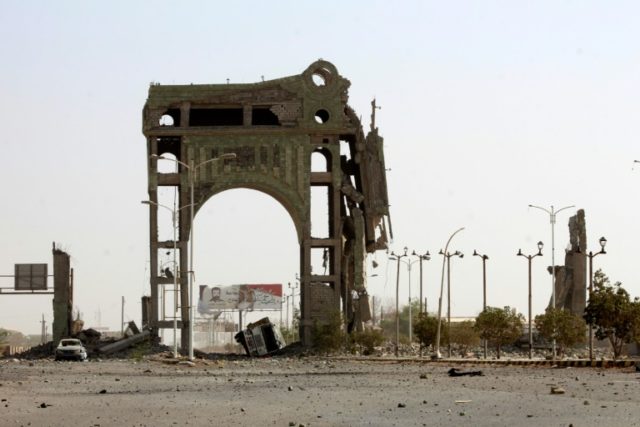The U.S. military this week revealed that it had conducted eight airstrike operations against the resurgent al-Qaeda in the Arabian Peninsula (AQAP) based in Yemen, which is considered one of the international terrorist group’s wings most intent on attacking the American homeland.
“In coordination with the government of Yemen, U.S. forces continue to support ongoing counterterrorism operations against AQAP and ISIS-Y [Islamic State-Yemen] to disrupt and destroy militants’ attack-plotting efforts, networks, and freedom of maneuver within the region,” Lt. Col. Earl Brown, a spokesman for U.S. Central Command (CENTCOM), declared in a statement issued on Monday.
CENTCOM is responsible for overseeing American military activity in and around the Middle East.
Last week’s airstrikes came days after Katherine Zimmerman, an expert on the Yemen war from the conservative American Enterprise Institute (AEI), warned a House panel that AQAP is positioned to “resurge” despite periodic efforts by the U.S. and the United Arab Emirates (UAE) that have “markedly weakened” the terrorist group.
AQAP “remains positioned to resurge from setback and benefits from the continuation of the civil war,” Zimmerman testified.
On Monday, CENTCOM revealed that it has “conducted 8 total air strikes” against AQAP in Yemen — including two in January in the Marib and al-Bayda provinces and six in March in just al-Bayda, home to a high concentration of jihadis.
“All [U.S.] strikes [in Yemen] this year targeted AQAP terrorists. The Jan. 1 strike targeted Jamal al-Badawi, one of the planners involved in the USS Cole bombing,” CENTCOM noted.
On January 1, the U.S. military killed the al-Qaeda jihadi linked to the 2000 bombing of the USS Cole in Yemen.
Although the U.S. has yet to release details about casualties from last week’s strikes, al-Masdar News reported that the American operation killed “three high-ranking” AQAP commanders identified as Abu Ammar Al-Hadrami, Abu Abdullah Al-Monzari, and Abu Al-Fahtani.
U.S. officials have described AQAP as one of the most potent and dangerous branches of al-Qaeda.
Experts such as Zimmerman from AEI have expressed concerns that AQAP is capitalizing on the chaos in Yemen to flourish and entrench itself deeper in the country.
Nevertheless, U.S. airstrikes against AQAP and its Islamic State (ISIS/ISIL) rival in Yemen have dramatically decreased in recent years from about 131 in 2017 to 38 in 2018.
The vast majority of U.S. strikes have targeted al-Qaeda jihadis in Yemen.
Some U.S. lawmakers are trying to end America’s support to the Saudi-led coalition in the wake of the kingdom’s alleged role in the killing of Jamal Khashoggi, a Washington Post reporter and critic of the royal family.
The Democrat-controlled House and Republican-held Senate have recently voted to end U.S. support for the war in Yemen, in defiance of President Donald Trump’s continued support for the Saudi-led coalition that began under his predecessor.
House lawmakers are expected to vote on the Senate resolution, a move that will likely put Congress on a collision course with Trump who has vowed to veto it.
While arguing that U.S. policy in Yemen has “failed,” Zimmerman and other experts conceded to lawmakers early last month that America’s support grants the United States leverage over the Saudi-led coalition.
Human rights groups have accused both the Sunni coalition and the Shiite Houthis of blocking much-needed aid to Yemen, home to the world’s worst humanitarian crisis exacerbated by the ongoing conflict.
In response to the Senate vote to end America’s involvement in the war last month, U.S. Secretary of State Mike Pompeo declared:
The senators who voted ‘aye’ say they want to end the bombing in Yemen and support human rights. But we really need to think about whose human rights. The way to alleviate the Yemeni people’s suffering isn’t to prolong the conflict by handicapping our partners in the fight, but by giving the Saudi-led coalition the support needed to defeat Iranian-backed rebels and ensure a just peace.
Since March 2015, a Saudi-led coalition, assisted by the United States military, has been fighting the Iran-allied Shiite Houthis to restore the internationally-backed administration of Yemeni President Abd Rabbo Mansour Hadi.
Despite several international efforts, peace remains elusive in Yemen.
In early March of this year, ahead of the Yemen war’s fourth anniversary, Zimmerman warned a House panel against pulling out of Yemen, noting, “America has vital national security interests in Yemen. Al Qaeda in the Arabian Peninsula (AQAP), one of the terrorist groups most focused on attacking the US homeland, retains a safe haven and support among local populations there.”
The U.S. and Saudi coalition member the UAE have periodically targeted AQAP in recent years, but the terrorist group “remains positioned to resurge from [the] setback and benefits from the continuation of the civil war,” Zimmerman told a House panel last month.
She acknowledged that support from the UAE to other groups fighting the Houthis has “inadvertently” aided AQAP.

COMMENTS
Please let us know if you're having issues with commenting.